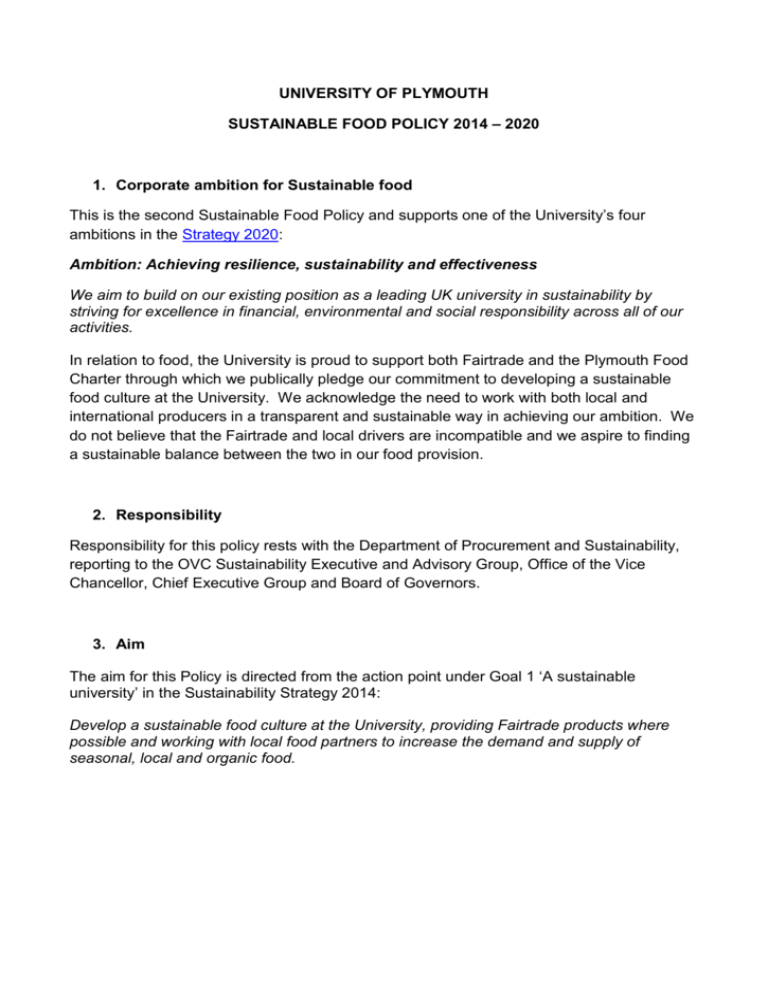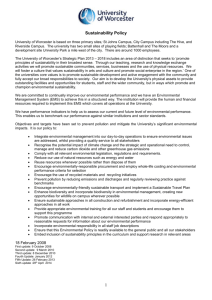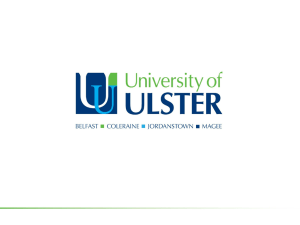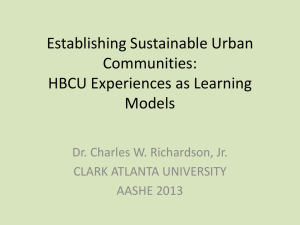Sustainable food policy
advertisement

UNIVERSITY OF PLYMOUTH SUSTAINABLE FOOD POLICY 2014 – 2020 1. Corporate ambition for Sustainable food This is the second Sustainable Food Policy and supports one of the University’s four ambitions in the Strategy 2020: Ambition: Achieving resilience, sustainability and effectiveness We aim to build on our existing position as a leading UK university in sustainability by striving for excellence in financial, environmental and social responsibility across all of our activities. In relation to food, the University is proud to support both Fairtrade and the Plymouth Food Charter through which we publically pledge our commitment to developing a sustainable food culture at the University. We acknowledge the need to work with both local and international producers in a transparent and sustainable way in achieving our ambition. We do not believe that the Fairtrade and local drivers are incompatible and we aspire to finding a sustainable balance between the two in our food provision. 2. Responsibility Responsibility for this policy rests with the Department of Procurement and Sustainability, reporting to the OVC Sustainability Executive and Advisory Group, Office of the Vice Chancellor, Chief Executive Group and Board of Governors. 3. Aim The aim for this Policy is directed from the action point under Goal 1 ‘A sustainable university’ in the Sustainability Strategy 2014: Develop a sustainable food culture at the University, providing Fairtrade products where possible and working with local food partners to increase the demand and supply of seasonal, local and organic food. Procurement & Sustainability Sustainable Food Policy 2014 - 2020 June 2014 4. Objectives Source local, Fairtrade and ethical produce and reduced food miles 1 Work with local producers and suppliers to increase the sale of local produce on campus and as a result reduce food miles 2 Source ethical produce as standard that protects wildlife and nature, source Fairtrade produce where available and promote seasonality 3 Reduce food waste and packaging waste associated with catering and increase composting and recycling Promote health and wellbeing for all: 4 Improve the availability of affordable, healthy and sustainable food in our food outlets and hospitality Develop lifelong learning & skills related to food: 5 Encourage our staff and students to become involved in community growing and other food-related volunteering activities 6 Provide opportunities to learn about good food through our research, teaching and food events Celebrate food events and initiatives to raise awareness of food sustainability: 7 Promote and celebrate food and culinary traditions through our food outlets and a variety of food events on campus and in the city 8 Support University and city-wide food initiatives that bring our internal and local communities together Reporting and monitoring: We will achieve our aims through a Sustainable Food Action Plan, against which we will set key performance targets to measure our performance on an annual basis. These KPIs will be reported to the Office of the Vice Chancellor, Senior Leadership Team and Board of Governors through their Audit Committee. Approved by the Sustainability Executive: Date: 15th July 2014 Procurement & Sustainability Sustainable Food Policy 2014 - 2020 June 2014 Sustainable Food Action Plan OBJECTIVE Work with local producers and suppliers to increase the sale of local produce on campus and as a result reduce food miles Source ethical produce as standard that protects wildlife and nature, source Fairtrade produce where available and promote seasonality ACTION Increase % of local food ingredients (from the South West) by 3% per annum up to and including 2016 to support the local economy WHO UCSP WHEN 2016 Ensure local, seasonal and sustainably sourced food is clearly marketed as such UCSP & ER & SU In place & ongoing Use of sustainability criteria in specification and selection of food suppliers UCSP 2014 3 SU Campus markets per year selling local food and crafts SU In place & ongoing Provide local, fresh produce/groceries for sale on campus to increase access to healthy, fresh food. Options include a Food Hub to order local produce online or a ‘market café’ UCSP & P&S 2015 Investigate if there is the interest for a food co-operative or joining up with existing Devon food co-operative P&S 2016 All whole/liquid/dried egg products are purchased from a free-range production system UCSP In place & ongoing Eliminate any fish from the MSC ‘fish to avoid list’ and seek to serve MSC certified fish where stocks allow. Fish that is not MSC certified will be locally sourced in the South West from boats part of the Responsible Fishing Scheme UCSP 2015 UCSP 2015 Implement a written service contract for the fish supplier for the above points UCSP 2016 UCSP In place & ongoing Ensure that 100% of fresh meat & dairy is from Red Tractor Assured products Follow Feel Good Days Guidance on meat & dairy portions and run a café as Procurement & Sustainability Sustainable Food Policy 2014 - 2020 UCSP 2015 100% of purchased fresh milk will be organic UCSP In place & ongoing Change menus in accordance with seasonal availability and serve main dishes with 2 seasonal ingredients (e.g. serving seasonal vegetables or fruit) UCSP 2015 Where products cannot be sourced locally or nationally, source where available Fairtrade products e.g. coffee UCSP 2015 All tea and coffee to be Fairtrade UCSP 2016 Achieve Bronze Catering Mark from the Soil Association in all applicable outlets and at least silver standard in three cafes UCSP 2016 Achieve top rating of three stars with the Sustainable Restaurant Association UCSP 2020 Only sell 100% fresh free range chicken within 5 years Reduction of usable food waste by 5% each year through schemes such smaller portions and donations to food bank UCSP Ongoing All food waste from catering to be separated and composted UCSP & P&S In place & ongoing Reduce the sale of bottled water and remove the use of bottled water for hospitality UCSP & P&S UCSP & SU 2015 Reduce food waste and packaging waste associated with catering and increase composting and recycling Improve the availability of affordable, healthy and sustainable food in our food outlets and hospitality Encourage our staff and June 2014 a Feel Good Café with meat free days and menu options Healthy diet options available and promoted in all University outlets every day Healthy hospitality menu offered as default UCS Complete Use of food cubes to bring the catering out onto campus. Space to be provided in one of the food cubes for a student run food enterprise. UCS 2016 Link with gardens and allotments on campus and utilize growing space for UCSP, 2016 Complete Procurement & Sustainability Sustainable Food Policy 2014 - 2020 students to become involved in community growing and other foodrelated volunteering activities Provide opportunities to learn about good food through our research, teaching and food events Promote and celebrate food through the diversity of our food outlets food events on campus and in the City Support University and citywide initiatives that bring our internal and local communities together CSF HES P&S UCSP SU catering kitchens June 2014 P&S, EFM, CSF ER, UCSP Maintain the cultural café (in the Reservoir Café) on campus run by volunteers Involve our Freshlings Nursery children in food and growing events CSF, UCSP In place & ongoing Provide a workshop a year focusing on educating staff and students on sustainable food (link with other workshops) HES 2015 Provide diversity through catering with international cuisine UCSP Two University international food and cultural events per year ER Promote local and Fairtrade products on menus and event menus ER, UCSP In place & ongoing In place & ongoing 2015 Contribution to City or Food Plymouth Partnership (PFP) (see FPP Action Plan 2011-14) and wider events P&S In place & ongoing Contribute to Sustainable Fish City initiative and application P&S 2014 Centre for Sustainable Futures Faculty of Health, Education & Society Procurement & Sustainability Catering Services Students Union In place & ongoing Procurement & Sustainability Sustainable Food Policy 2014 - 2020 June 2014








